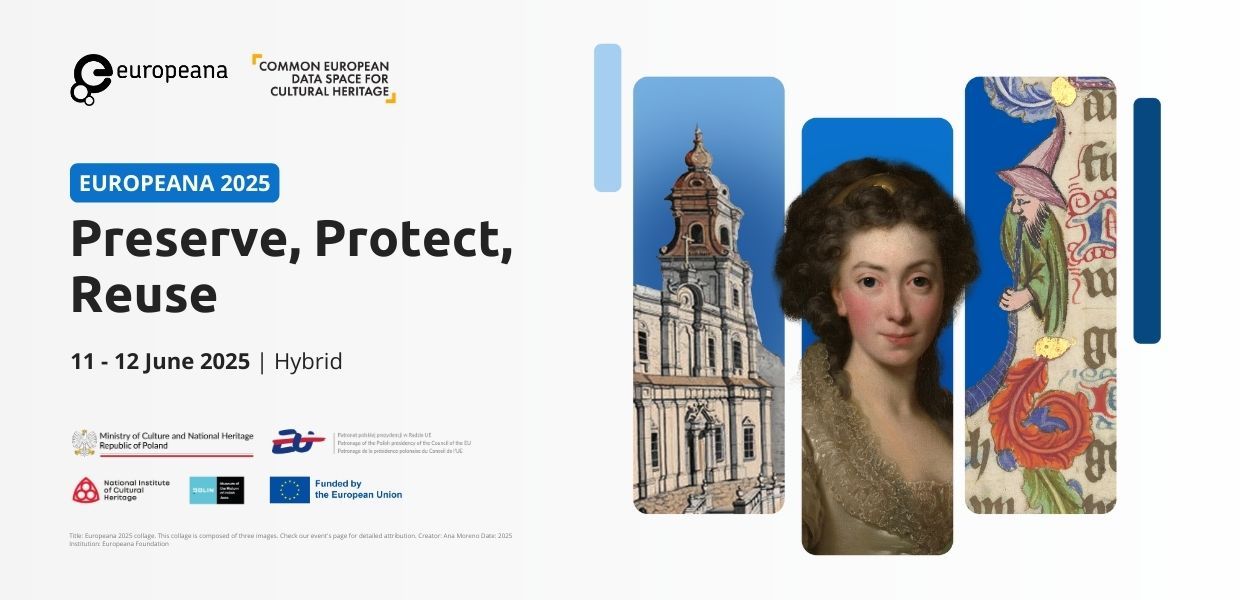What’s in focus at Europeana 2025 - Preserve, Protect, Reuse?
Of course, the clue is in the conference name. Gathering experts from across the common European data space for cultural heritage and beyond, Europeana 2025 will explore how the cultural heritage sector can actively maintain and safeguard cultural heritage and digital data in the data space; defend digital cultural heritage from physical and cyber threats; and support and increase the reuse of cultural heritage data. With the conference organised under the patronage of the Polish Presidency of the Council of the EU, in collaboration and partnership with the Ministry of Culture and National Heritage of Poland, the National Institute of Cultural Heritage and the POLIN Museum of the History of Polish Jews, the conference will offer vital local, national, European and international perspectives on the crucial themes of heritage preservation, protection and reuse of cultural heritage.
But how do these themes translate into discussions, speakers and workshops? Read on as we pick out five hot topics for the cultural heritage sector that will be covered through the conference programme - explore them now and get your tickets before they’re gone!
1. 3D
If you’re working with, or curious about, 3D in cultural heritage, you won’t want to miss the discussions at Europeana 2025. Mindful of the need to upskill, invest in and strengthen cooperation to meet the European Commission’s goal of 3D digitising all at-risk monuments and sites and half of the most visited by 2030, the conference will explore how 3D technologies can be used to preserve and protect cultural heritage - and what we need to do to get there.
Sessions on this topic will cover its varied aspects. Colleagues working on the International Image Interoperability Framework (IIIF) will explore expanding the sustainability of digital heritage into the third dimension, while the the sector’s needs for skills, quality standards and infrastructure will be explored by the Eureka3D-XR project, with the Time Machine Organisation and 3DBigDataSpace spotlighting real world 3D applications. A workshop on 'Sculpting digital skills: 3D-4CH capacity building for heritage professionals' will help to boost your practical skills. And there will be an exciting announcement about the next chapter of the Twin it! 3D for Europe’s culture campaign!
2. Artificial intelligence
How does AI bring value to culture, and how is culture shaping the future of AI? What opportunities - and challenges - does AI bring for the preservation, protection and reuse of digital cultural heritage? Europeana 2025 will dive into these questions, kicking off with an opening keynote from Birgitte Aga, Head of Innovation and Research, MUNCH Museum, on ‘Demystifying AI and unlocking the power of cultural heritage data.’ AI will be in focus throughout the programme, with a workshop dedicated to how AI can be used to detect bias in heritage collections, and talks exploring the use of AI in storytelling and building trust in archives in the AI era. Discover trends, best practices and dilemmas and learn how AI is reshaping reuse and copyright . Finally, a dedicated session will focus on the initial results of the Alignment Assembly on Culture for AI - a participatory, collective intelligence process aimed at clarifying our community’s position on the development, implementation and use of AI in the common European data space for cultural heritage. With expert speakers on these topics on hand to answer your burning questions, these sessions are not to be missed!
3. Funding
Cultural heritage institutions face growing economic and social challenges - but there is also a growing range of EU funding opportunities available for the cultural heritage sector. How can those working in the sector make sense of the landscape? You might find the answers you’re looking for in the panel ‘Funding the future: opportunities for digital heritage,’ which will explore funding opportunities across the digital cultural heritage ecosystem. Whether you work for a small cultural heritage institution or a large sectoral body, don’t miss this chance to get the latest news about grants and funding schemes, gain insights into how to optimise your own applications and find project partners.
4. Engaging communities
Understanding and engaging the communities who generate and reuse (digital) cultural heritage is key to ensuring the relevance and impact of our sector, and this is reflected in the Europeana 2025 programme. The session ‘Collective memory: co-creating collections with communities’ will highlight inspiring examples of working with local and youth communities, while a workshop from the RECHARGE project will demonstrate how a participatory approach can and should be integrated into a cultural project from start to finish with the Living Lab methodology. Designing for communities and social responsibility are at the core of further sessions which explore the value of involving communities in initiatives designed for them.
5. Skills building
Building the capacity of professionals working across the cultural heritage sector to protect, preserve and support reuse of cultural heritage is both a topic and an approach at Europeana 2025. Afternoon workshops, given by experts and drawn from our conference call for proposals, will offer you the chance to grow tangible skills and knowledge on the topics covered above - 3D, AI and engaging communities - as well as on planning and measuring impact and making cultural heritage collections permanent and persistent. A ‘Skills Booster’ workshop will also demonstrate how you and your colleagues can build your skills and access training in the future through Europeana Academy.
Get your ticket now
All sounding good to you? Then don’t miss your chance to get your ticket now!
While you can access the conference online, to unlock all of the opportunities it has to offer, we encourage you to join us in Warsaw to discover this vibrant European city and opportunities for collaboration across the continent.


